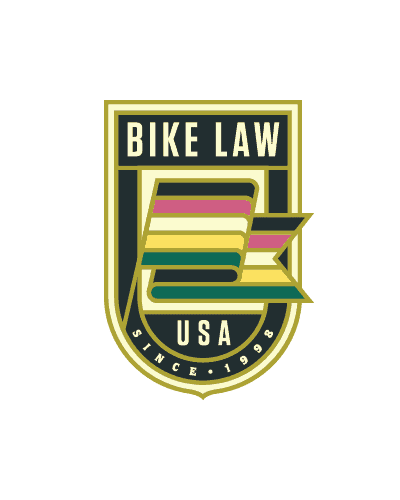It’s important to know your legal rights (and duties) when bicycling in Florida. It is especially important after a bicycle accident (we call them bicycle “crashes” and explain why here). Florida bicycle laws can be difficult to understand.
This is a general overview of Florida’s bicycle laws. To see them in their completion, please visit Florida’s Department of Transportation. For any questions about this State’s bike laws, or about your rights to the road, contact Florida’s Bike Law Attorney Peter Wilborn directly.
Right to the Road
Bicycles are defined as vehicles and generally have the same rights and responsibilities as motor vehicle drivers. But, in Florida, when cyclists rides on sidewalks, they are considered pedestrians.
Where to Ride
- When traveling slower than the normal speed of traffic and there is no bike lane, bicyclists are required to ride as far to the right of the roadway as practicable, unless the bicyclist is preparing for a turn, overtaking and passing, traveling on a one-way street, avoiding hazards, traveling in a lane too narrow to share, and avoiding a mandatory turn lane.
- Bicyclists are not required to ride in a bike “path” (a “path” is not in the roadway; a “lane” is) hat has been provided adjacent to a roadway when available.
- Bicycles are permitted on sidewalks (most places in Florida but not all) but bicyclists riding on the sidewalk must yield to the right-of-way of any pedestrians and must give an audible signal before overtaking and passing a pedestrian. Check local ordinances for variations on this rule.
How to Ride
- Bicyclists in the road or in a bike lane shall not ride more than two abreast, unless in a bike path. When traveling slower than the normal speed of traffic, bicyclists may not impede traffic and must ride single file. In a bike lane, the two abreast riders must fit within the lane.
- Bicyclists are required to slow down and come to a complete stop at stop signs and traffic devices signaling red.
- Bicyclists must look behind them, signal and yield to traffic present when turning, changing lanes, and coming to a stop.
Bicyclists Overtaking Cars
Bicyclists on roadways must exercise due care when passing a standing vehicle or one proceeding in the same direction.
Cars Overtaking Bicyclists
Motor vehicle drivers are required to pass bicyclists with at least three (3) feet clearance.
Equipment
- Bicyclists under the age of 16 are required to wear a properly fastened helmet.
- At night, a bicycle must be equipped with a front white light visible from 500 feet away and a rear red reflector and lamp visible from 600 feet away.
- Every bicycle must have brakes which enable the bicyclist to stop within 25 feet from a speed of 10 miles per hour on dry, level, clean pavement.
Prohibitions
- Clinging to motor vehicles while bicycling is not permitted.
- Bicyclists may not leave a child in a child seat or carrier on a bicycle unattended.
- Bicyclists may not wear headsets or earplugs while riding unless it is a hearing aid or instrument for improvement of defective human hearing. Bicyclists may use a headset that only provides sound through one ear and permits surrounding sounds to be heard with the other ear.
- Bicyclists must secure passengers under 4 years of age or under 40 pounds in a seat, carrier, backpack or sling.
Motor Vehicle Drivers and Dooring
Motor vehicle drivers may not open a motor vehicle door with the intent to strike, injure, interfere with any bicyclist, or to interfere with the movement of traffic.
Vulnerable Road User Law (VRU)
Bicyclists are defined as vulnerable road users but currently Florida does not have a vulnerable road user law which gives sentencing judges a greater ability to increase the punishments imposed on drivers who injure vulnerable road users.
Alcohol
Florida’s DUI statute does apply to bicyclists as bicycles are defined as vehicles.
Contact a Florida Bicycle Accident Attorney Today
In Florida, our mission is to support injured cyclists and promote a safer environment for everyone on two wheels. Whether it’s pushing for better legislation, educating the public and law enforcement, or assisting our clients during tough times, Peter and Rachael are committed to helping.
If you or a loved one has been harmed by a negligent driver, a faulty bicycle part, or hazardous road conditions, reach out to Peter Wilborn, a Florida bicycle accident lawyer, at 843-416-9060 or email him at peter@bikelaw.com. We offer free consultations and are ready to help you navigate your personal injury claim.
